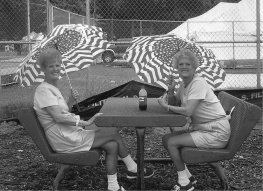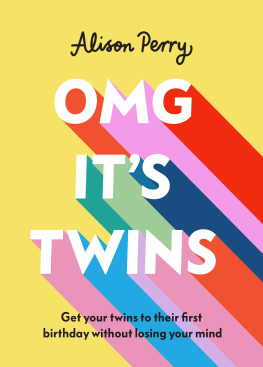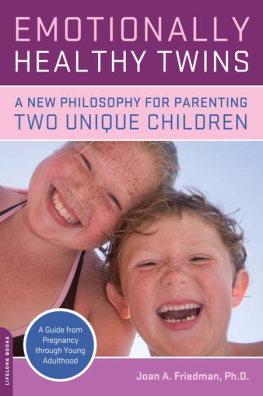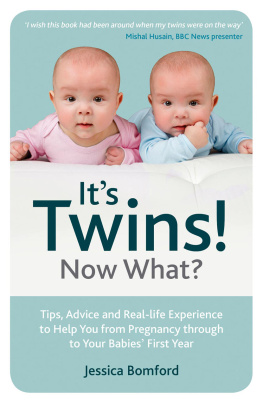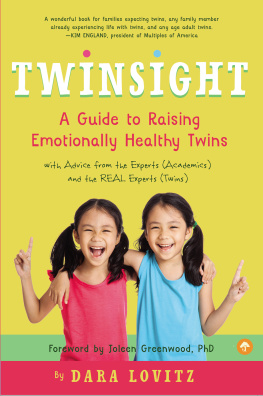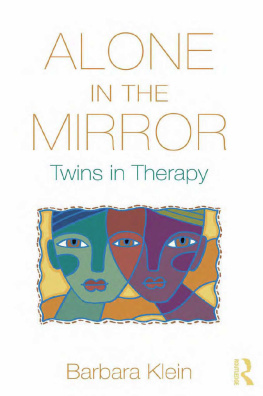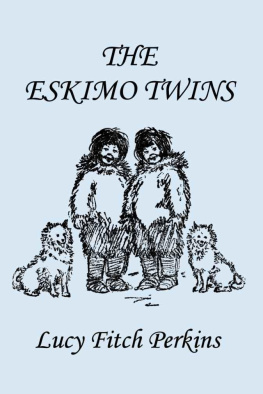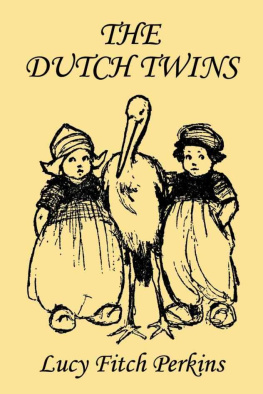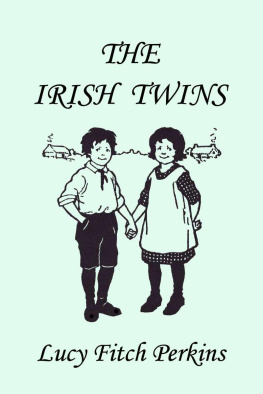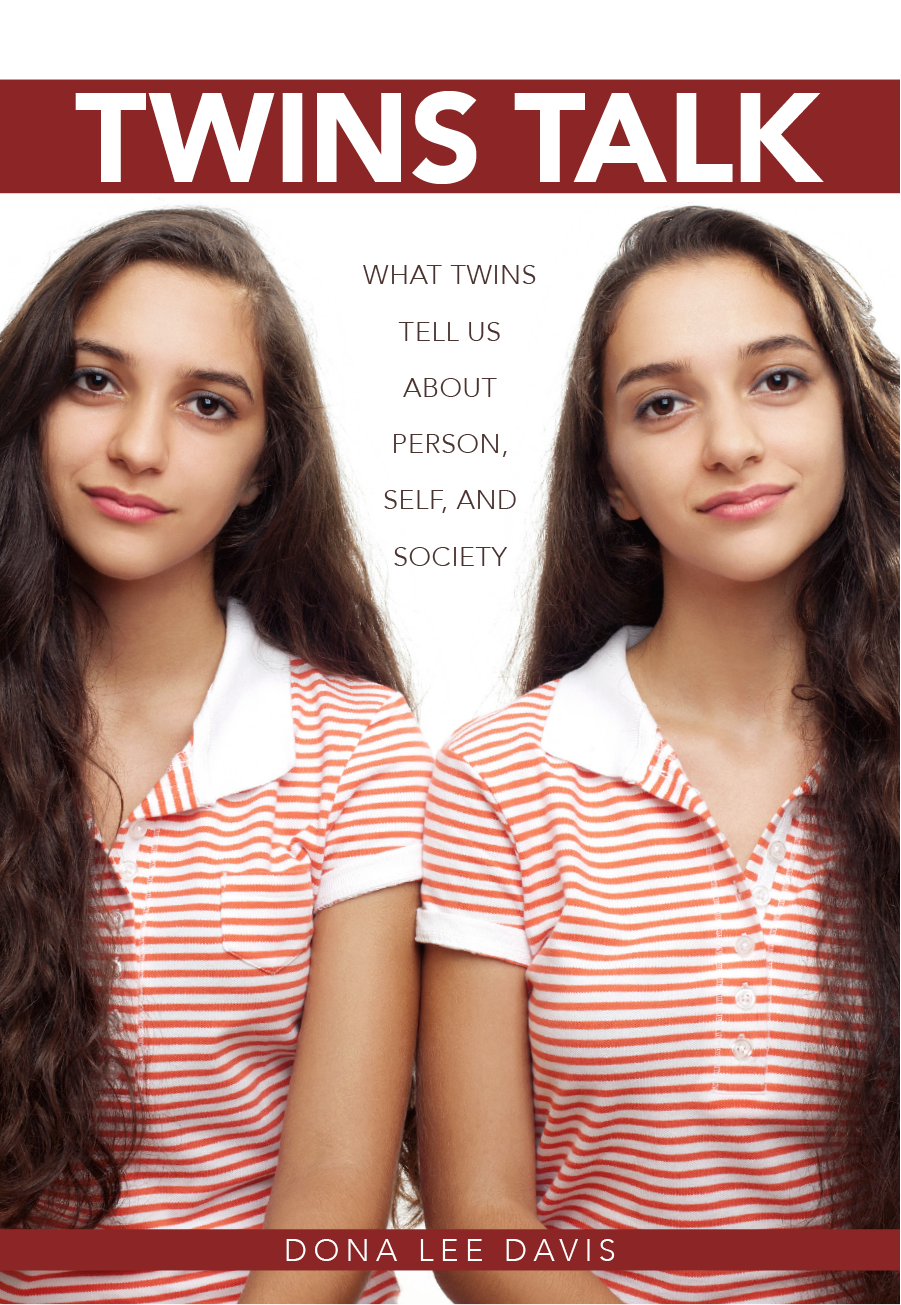
Twins
Talk
What Twins Tell Us about Person, Self, and Society
Dona Lee Davis
Ohio University Press Athens, Ohio
Ohio University Press, Athens, Ohio 45701
ohioswallow.com
2014 by Ohio University Press
All rights reserved
To obtain permission to quote, reprint, or otherwise reproduce or distribute material from Ohio University Press publications, please contact our rights and permissions department at (740) 593-1154 or (740) 593-4536 (fax).
Printed in the United States of America
Ohio University Press books are printed on acid-free paper
24 23 22 21 20 19 18 17 16 15 14 5 4 3 2 1
Library of Congress Cataloging-in-Publication Data
Davis, Dona Lee, 1948
Twins talk : what twins tell us about person, self, and society / Dona Lee Davis.
pages cm
Includes bibliographical references and index.
ISBN 978-0-8214-2111-6 (hardback) ISBN 978-0-8214-2112-3 (pb) ISBN 978-0-8214-4499-3 (pdf)
1. TwinsUnited States. 2. TwinsSocial aspectsUnited States. 3. Ethnology. I. Title.
GN63.6.D38 2015
306.8750973dc23
2014029923
Acknowledgments
The idea of studying twins grew out of my experiences in giving a series of lectures on embodiment, self, and society at the University of Troms in Norway in the 1990s. During that time there was a considerable controversy among the indigenous Norwegian Sami people and representatives of the Human Genome Diversity Project. The controversies whet my curiosity about the relationships between genes and identity, but in a way that was much closer to homethe home of my own body. A study of twins promised to offer some interesting insights into many intersecting planes of experience and analysis, among which are body/biology, personal/social identity, relatedness/relationality, and culture. The two-day research opportunities offered at the Twinsburg, Ohio, Twins Days Festival made it all seem feasible. After having done fieldwork among fishers in Newfoundland and northern Norway, I found the prospect of conducting a study in an area where I had an insiders perspective based on my own lifetime of firsthand experiences of being a twinof finally becoming a local expertvery inviting. Twins Talk as an exercise in quick ethnography was also developed as a way for my identical twin sister, Dorothy, and me to spend some time together. My intent at its most ambitious was to present some conference papers and perhaps an article or two. I had not anticipated how interesting twins would be to think with, and what started as a short-term project evolved into a much more involved endeavor.
As I became a twin researcher myself and became more and more immersed in the popular and scientific twin literature, I was put off by the predominating biological and genetic essentialism of twin research and the inherent pathologization of twinship or the twin relationship, most prominently in psychology but in other disciplines as well. Identical twins are variously depicted as clones, as a self and almost self inside the same physical package, and as a single unit or closed society of two. These characterizations seem to have minimal relevance to my own more than six decades of being a twin. What did resonate with my anthropological curiosity, however, were the contentions that identical twins are an unsettling presence that undermines a sense of uniqueness or challenges characterizations of selfhood in the wider (Western) society. My goal became twofold: First, to explicate just what those assumptions or characterization of selfhood were. And second, to provide a voice for twins in this process. Thus it is the intent of Twins Talk to quite literally address what twins tell us about the experience of being twins in Western society. And in turn, Twins Talk becomes a vehicle for comparing twins own narratives of their being in the world to the narratives of those who have made twins topics of research. In the process, there emerges a very rich and rewarding source for informed anthropological analysis as it intersects with multiple other disciplines.
Many people over the years have helped with this Twins Talk Study. I would like to thank the Department of Social Anthropology at the University of Troms in Norway (now the Arctic University of Norway) and the Twins Days Festival Committee for their research grants that helped fund this study. The University of South Dakota (USD) Tuve Fund provided travel funds for Kristi Cody, the projects research assistant, as well as travel funds that enabled Dona to present papers at a number of professional conferences. Kristi Cody, an anthropology major at USD, was an enthusiastic and energetic research assistant. Sandy Miller and the Twins Days Festival Committee provided invaluable help and encouragement during the initial stages of this study. Angela Harrison successfully took on the challenging job of transcribing many hours of taped four-way conversations. Evie Clerx, Danielle Emond, Elizabeth Johnson, and, all USD undergraduate students, have also worked with me on this project. Thanks also go to Jane Nadel-Klein, Gisli Plsson, Barbara Prainsack, and Elizabeth Stewart for their encouragement and support of the project. Of course, special thanks go to the forty-four twins who participated in the Twinsburg Twins Talk Study, taking the time to sit down and share their lives and experiences of being twins. I hope they enjoyed these conversations. I certainly did. Their stories helped confirm how interesting and wonderful it is to be a twin. Extra special thanks to my twin sister, Dorothy Davis, who played an essential role in the data gathering and attended three festivals with me. It was the first time in our lives that we had the opportunity to talk as twins to twins. Finally, thanks to Richard Whitten, my life partner, whose love and support I will always treasure.
1: Twinscapes
A Sufi teaching story tells of the holy fool Mulla Nasrudin who ventured to a strange city. Before he left on his journey, his wife put a sign around his neck with his name on it so that he would not forget his identity. When he arrived, he spent the first night at a caravanserai; while he slept, a joker took the sign and put it around his own neck. When the Mulla awoke, he was appalled to find his name tag on the jokers chest. It seems, he cried, that you are me. But if you are me, then who am I?
Lindholm 2001
Each individual is biologically unique.
Plsson 2007
What would it be like to have lived ones whole life without ever having seen your own face?
Herdt 1999
Like Charles Lindholm, I begin my book with a fools tale. Lindholm (2001, 3) places the Sufi story at the very beginning of his book Culture and Identity, in chapter 1, titled Who Am I? The Search for the Self. He comments that although the Mullas dilemma is ridiculous, it nonetheless raises central issues concerning the development of a more culturally sensitive or nuanced understanding of ones sense of someoneness, or identity. The physical body, perceptions of self in relation to other selves, and self as positioned or situated and acting within a wider cultural milieu are all essential components of ones sense of self (de Munck 2000; Markus et al. 1997). Yet, if you are an identical twin, Mullas ridiculous dilemma becomes a kind of double entendre. In the case of identical twins, the fools tale becomes real. There actually is someone else who is wearing the visual signs of your identity on their face and body. Twins physical similarities often result in others confusing, confounding, and conflating their self-identities. Moreover, for twins raised together, their senses of someoneness develop in a dyadic, coexistent mutuality, or sharing of place and space that actually begins before birth. It should come as no surprise that the academic literature, as well as popular imagination, depicts identical twins as living embodiments of two related questions: What is truly other and what is self? and Is it possible to inhabit another persons being? (Neimark 1997, 3).
Next page
